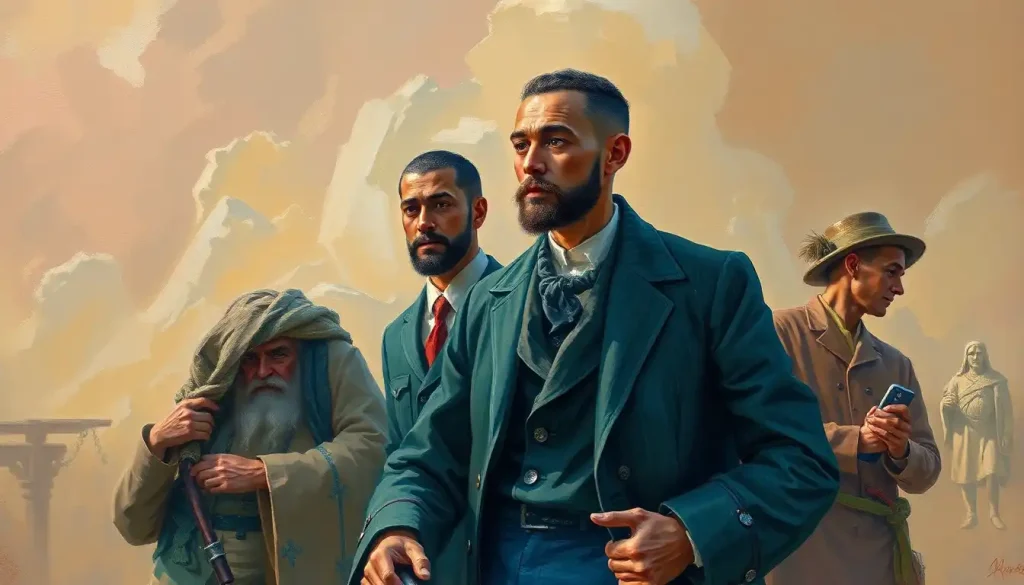From garage tinkerers to billionaire visionaries, the world of entrepreneurship is a thrilling tapestry of innovation, risk-taking, and game-changing ideas that have reshaped our lives and economies. It’s a realm where dreams take flight, where the impossible becomes possible, and where ordinary individuals transform into extraordinary changemakers. But what exactly makes an entrepreneur tick? What drives these intrepid souls to venture into uncharted territories, risking it all for a shot at greatness?
At its core, entrepreneurship is about spotting opportunities where others see obstacles. It’s about having the guts to chase wild ideas and the grit to see them through. Entrepreneurs are the dreamers who dare to do, the visionaries who refuse to settle for the status quo. They’re the ones who look at the world and ask, “What if?” and then roll up their sleeves to make it happen.
But don’t just take my word for it. Let’s dive into the stories of some truly remarkable individuals who’ve left an indelible mark on the business world and beyond. From tech titans to social crusaders, these folks have shown us what it means to be a true entrepreneur. So buckle up, because we’re about to embark on a whirlwind tour of inspiration, innovation, and sheer entrepreneurial chutzpah!
Iconic Entrepreneurs: Household Names That Changed the Game
Let’s kick things off with a name that’s practically synonymous with innovation: Steve Jobs. This guy wasn’t just thinking outside the box; he was busy redesigning the whole darn box! As the co-founder of Apple, Jobs didn’t just give us sleek gadgets; he revolutionized how we interact with technology. From the first Macintosh to the iPhone, Jobs had an uncanny knack for knowing what we wanted before we even knew we wanted it.
But Jobs wasn’t just about creating cool products. He was a master of storytelling, turning product launches into must-see events. Remember those “Think Different” ads? Pure Jobs magic. He showed us that entrepreneurship isn’t just about having great ideas; it’s about selling those ideas with passion and flair.
Now, let’s rocket over to another visionary who’s been busy redefining what’s possible: Elon Musk. This guy’s got more irons in the fire than a blacksmith on steroids! From electric cars with Tesla to space exploration with SpaceX, Musk is the kind of entrepreneur who looks at the biggest challenges facing humanity and says, “Hold my beer.”
What sets Musk apart is his willingness to take on industries that most would consider too risky or too entrenched to disrupt. Electric cars? Space travel? Underground tunnels? Musk doesn’t just think big; he thinks galactic. And while his methods might sometimes raise eyebrows, there’s no denying the impact he’s had on pushing the boundaries of what’s possible in business and technology.
But hey, entrepreneurship isn’t just a boys’ club. Let’s talk about Oprah Winfrey, a woman who turned a local talk show into a media empire and became one of the most influential voices of our time. Oprah’s journey from a tough childhood in rural Mississippi to becoming North America’s first Black multi-billionaire is the stuff of entrepreneurial legend.
What makes Oprah’s story so compelling is how she leveraged her personal brand to build a diverse business empire. From her talk show to her magazine, from her book club to her television network, Oprah has shown a remarkable ability to connect with audiences and turn that connection into successful business ventures. She’s not just a media mogul; she’s a philanthropist revolutionizing both business and charity, using her success to make a positive impact on the world.
Modern-Day Mavericks: New-School Entrepreneurial Success Stories
Now, let’s fast forward to some more recent entrepreneurial superstars. First up, Mark Zuckerberg, the hoodie-wearing wunderkind who turned a college dorm room project into a social media behemoth. Love it or hate it, Facebook (now Meta) has fundamentally changed how we connect, share, and even think about privacy in the digital age.
Zuckerberg’s story is a masterclass in scaling a business at breakneck speed. From its humble beginnings as a way for college students to connect, Facebook grew into a global platform with billions of users. But it hasn’t all been smooth sailing. Zuckerberg’s journey also highlights the challenges entrepreneurs face as their creations grow beyond their original vision, dealing with issues of privacy, misinformation, and the societal impact of their platforms.
Speaking of impact, let’s talk about Sara Blakely, the woman who turned control-top pantyhose into a billion-dollar business. Blakely’s journey with Spanx is a testament to the power of solving a problem that nobody else seemed to be addressing. She saw a gap in the market (quite literally) and filled it with a product that resonated with millions of women worldwide.
What’s particularly inspiring about Blakely’s story is how she built her empire from the ground up, with no outside investment. She’s the epitome of the scrappy entrepreneur, cutting the feet off her pantyhose to create her first prototype and personally pitching her product to department stores. Blakely’s success shows that with enough determination and a great idea, you can disrupt even the most established industries.
And speaking of disruption, let’s not forget Brian Chesky, the co-founder of Airbnb. Here’s a guy who, along with his roommates, turned the simple idea of renting out an air mattress in their living room into a global hospitality revolution. Airbnb didn’t just create a new business; it created a whole new way of thinking about travel and accommodation.
Chesky’s story is a perfect example of how entrepreneurs can spot opportunities in unexpected places. By tapping into the sharing economy and leveraging technology, Airbnb challenged the traditional hotel industry and opened up new possibilities for travelers and property owners alike. It’s a reminder that sometimes the best business ideas come from solving our own problems.
Local Heroes: Small Business Entrepreneurs Making Big Waves
But entrepreneurship isn’t just about building tech giants or global brands. Some of the most inspiring stories come from local entrepreneurs who are making a big impact in their communities. Take, for example, the story of Chef Erin French, owner of The Lost Kitchen in Freedom, Maine. French turned a small, seasonal restaurant in rural Maine into a culinary destination, with reservations so sought-after that they’re decided by lottery.
French’s success isn’t just about serving great food; it’s about creating an experience that celebrates local ingredients and community. Her farm-to-table approach has not only put her tiny town on the culinary map but has also supported local farmers and producers. It’s a beautiful example of how entrepreneurship can revitalize local economies and preserve traditional ways of life.
Or consider the story of Boyan Slat, the young Dutch entrepreneur who founded The Ocean Cleanup at the age of 18. Slat’s organization develops advanced technologies to rid the world’s oceans of plastic. What started as a high school science project has grown into a global initiative tackling one of our planet’s most pressing environmental issues.
Slat’s story shows how entrepreneurship can be a powerful force for solving big, complex problems. By combining innovative technology with a passionate mission, he’s not only building a successful organization but also inspiring a new generation of environmentally conscious entrepreneurs.
And let’s not forget about the countless artisans and craftspeople who are leveraging e-commerce platforms to turn their passions into thriving businesses. Take Leanne Lauricella, for example. She turned her love for rescued goats into Goats of Anarchy, a sanctuary that’s become a social media sensation and a successful merchandise brand. Lauricella’s story is a perfect example of how the internet has opened up new possibilities for niche entrepreneurs to find their audience and build a global brand.
These local heroes remind us that entrepreneurship isn’t just about becoming the next tech billionaire. It’s about having the courage to pursue your passion, solve problems in your community, and create value in unique and unexpected ways.
Social Entrepreneurs: Changing the World, One Business at a Time
Now, let’s talk about a special breed of entrepreneurs who are proving that you can do well by doing good. These social entrepreneurs are using business principles to tackle some of the world’s most pressing problems, showing that profit and purpose can go hand in hand.
First up, Muhammad Yunus, the Bangladeshi economist who pioneered the concept of microfinance. Yunus founded Grameen Bank, which provides small loans to poor people, particularly women, to help them start businesses and lift themselves out of poverty. His work has challenged traditional banking models and shown how entrepreneurship can be a powerful tool for social change.
Yunus’s approach isn’t just about giving handouts; it’s about empowering people to become entrepreneurs themselves. By providing access to capital and financial education, Grameen Bank has helped millions of people start businesses, improve their lives, and contribute to their local economies. It’s a powerful example of how entrepreneurial thinking can solve complex social problems.
Then there’s Blake Mycoskie, the founder of TOMS Shoes. Mycoskie pioneered the “One for One” business model, where for every pair of shoes sold, TOMS would donate a pair to a child in need. This innovative approach to social entrepreneurship showed that consumers were willing to support businesses that made giving back a core part of their model.
Mycoskie’s success with TOMS inspired a wave of similar businesses, proving that social responsibility could be a powerful differentiator in the marketplace. It’s a great example of how entrepreneurs can create new business models that align profit with social impact.
Lastly, let’s talk about Leila Janah, the founder of Samasource. Janah’s company provides digital work to people living in poverty, proving that technology can be a powerful tool for creating economic opportunities in underserved communities. By connecting marginalized workers with digital jobs from major tech companies, Samasource has shown how entrepreneurship can bridge the global digital divide.
Janah’s work challenges us to think differently about outsourcing and the global workforce. She’s shown that with the right training and opportunities, talented individuals from anywhere in the world can contribute to the digital economy. It’s a powerful reminder of the untapped human potential that exists in communities often overlooked by traditional businesses.
These social entrepreneurs are rebel entrepreneurs, disrupting industries and redefining success. They’re showing us that business can be a force for good, tackling social and environmental challenges while still building successful, profitable enterprises.
The Secret Sauce: Key Traits of Successful Entrepreneurs
So, what sets these entrepreneurial rockstars apart? What’s the secret ingredient that turns a good idea into a world-changing business? While there’s no one-size-fits-all formula for entrepreneurial success, there are some key traits that seem to pop up again and again in the stories of successful entrepreneurs.
First up, innovation and creativity. Successful entrepreneurs don’t just come up with new ideas; they come up with ideas that solve real problems in new and exciting ways. They’re the ones who look at the world differently, spotting opportunities where others see obstacles. It’s not just about inventing new products; it’s about reimagining entire industries and ways of doing business.
But having great ideas isn’t enough. Entrepreneurs need the guts to take risks and the resilience to bounce back when things don’t go as planned. And let’s face it, in the world of entrepreneurship, things rarely go exactly as planned. Successful entrepreneurs aren’t afraid to fail; they see failure as a learning opportunity, a stepping stone on the path to success.
Vision and leadership are also crucial. Entrepreneurs need to be able to see the big picture, to imagine a future that doesn’t yet exist, and to inspire others to help make that vision a reality. It’s about more than just being the boss; it’s about being a visionary who can rally people around a common goal.
But perhaps the most important trait of all is adaptability and a commitment to continuous learning. The business world is constantly changing, and entrepreneurs need to be able to pivot and evolve along with it. They’re the ones who are always learning, always growing, always looking for new ways to improve and innovate.
These traits aren’t just nice-to-haves; they’re the essential ingredients that allow entrepreneurs to navigate the choppy waters of the business world. They’re what separate the dreamers from the doers, the wannabes from the game-changers.
Wrapping It Up: The Entrepreneurial Spirit in Action
As we’ve seen, the world of entrepreneurship is incredibly diverse. From tech titans like Steve Jobs and Mark Zuckerberg to social innovators like Muhammad Yunus and Blake Mycoskie, from local heroes revolutionizing their communities to global changemakers tackling some of the world’s biggest challenges, entrepreneurs come in all shapes and sizes.
What unites them is a burning desire to make a difference, to create something new, to solve problems and seize opportunities. They’re the ones who aren’t content with the way things are, who have the courage to imagine how things could be, and the determination to make it happen.
To all the aspiring entrepreneurs out there, remember this: every great business started with a single idea and a whole lot of hustle. Don’t be afraid to dream big, to take risks, to fail and try again. The world needs your ideas, your passion, your innovation.
And let’s not forget the broader impact of entrepreneurship on our society and economy. Entrepreneurs aren’t just building businesses; they’re creating jobs, driving innovation, and shaping the future of our world. They’re the engine of economic growth, the source of new ideas and technologies that improve our lives in countless ways.
So here’s to the entrepreneurs, the dreamers, the doers, the icons of innovation and success in business. Whether you’re working on the next world-changing app in your garage or dreaming up ways to make your local community a better place, you’re part of a proud tradition of innovators and risk-takers who have the power to change the world.
Remember, entrepreneurship isn’t just about making money; it’s about making a difference. It’s about having the courage to pursue your passion, the resilience to overcome obstacles, and the vision to see possibilities where others see problems. So go forth and innovate, create, and inspire. The world is waiting for your next big idea!
References:
1. Isaacson, W. (2011). Steve Jobs. Simon & Schuster.
2. Vance, A. (2015). Elon Musk: Tesla, SpaceX, and the Quest for a Fantastic Future. Ecco.
3. Winfrey, O. (2014). What I Know For Sure. Flatiron Books.
4. Kirkpatrick, D. (2010). The Facebook Effect: The Inside Story of the Company That Is Connecting the World. Simon & Schuster.
5. Blakely, S. (2022). The Wind at My Back: Resilience, Grace, and Other Gifts from My Mentor, Coretta Scott King. Penguin Press.
6. Gallagher, L. (2017). The Airbnb Story: How Three Ordinary Guys Disrupted an Industry, Made Billions . . . and Created Plenty of Controversy. Houghton Mifflin Harcourt.
7. French, E. (2021). Finding Freedom: A Cook’s Story; Remaking a Life from Scratch. Celadon Books.
8. Slat, B. (2017). How the Oceans Can Clean Themselves: A Feasibility Study. The Ocean Cleanup.
9. Yunus, M. (2007). Banker to the Poor: Micro-Lending and the Battle Against World Poverty. PublicAffairs.
10. Mycoskie, B. (2011). Start Something That Matters. Spiegel & Grau.
11. Janah, L. (2017). Give Work: Reversing Poverty One Job at a Time. Portfolio.
12. Ries, E. (2011). The Lean Startup: How Today’s Entrepreneurs Use Continuous Innovation to Create Radically Successful Businesses. Crown Business.












Would you like to add any comments? (optional)